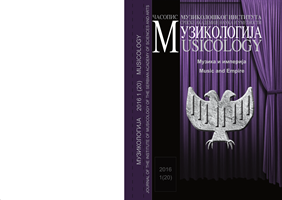Music as Intersubjectivity – A Problematic for the Sociology of the Arts
Music as Intersubjectivity – A Problematic for the Sociology of the Arts
Author(s): Mikko LagerspetzSubject(s): Music, Sociology of Art, History of Art
Published by: Muzikološki institut SANU
Keywords: Music; face-to-face interaction; Schütz; intersubjectivity; Sociology of the Arts;
Summary/Abstract: Music has the power of establishing a sense of personal closeness and of confirming the existence of a meaningful reality. This is because it creates, or imitates a face-toface situation in which participants experience the same events during shared time. Face-to-face interaction is the primary means by which humans are able to conduct a “reality check” in the face of chaos, sense of meaninglessness and unreality. However, this interaction is basically “about nothing”; in this sense, it is an instance of “pure sociality”. Musical phenomena are semiotic in nature only insofar as they do not stand for themselves, but for something else. When describing social facts and social practices, we are heavily dependent on words and concepts. At the same time, the arts do, by definition, endeavour to bring about experiences that are untranslatable to any other form of expression. Arts sociologists’ answer to this dilemma has most often been to turn away from the arts themselves and to concentrate instead on the social fields and activities that surround them. This essay suggests a perspective of music as interaction creating an intersubjectively shared experience. At the same time, it is admitted that music, similarly to any other kind of interaction, can also fail in this, or be used deliberately for exclusion. This essay invites discussion on possible uses of this perspective in sociological and cultural research.
Journal: Muzikologija
- Issue Year: 1/2016
- Issue No: 20
- Page Range: 223-239
- Page Count: 17
- Language: English

